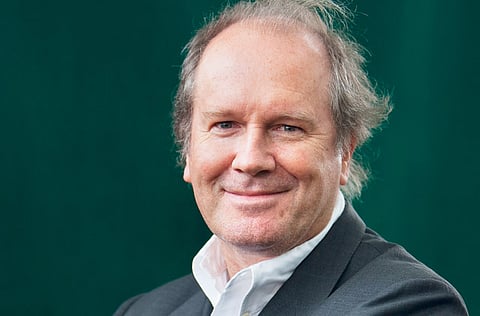Author William Boyd on collision with reality
Author William Boyd on how he has interwoven fact and fiction for his narrative of a personal journal

It is pouring with rain, thunderclouds gathering with theatrical intensity over the Soho streets, but when William Boyd walks into the room he is absolutely dry. There is not a hint of dampness about him.
And yet, partly because I have been re-reading Any Human Heart in preparation for our meeting, I am not entirely surprised by Boyd's unruffled appearance. After all, this is the author who constructed a 500-page novel purporting to be the personal journals of Logan Mountstuart, a fictional writer whose 85-year life spanned each decade of the 20th century. Boyd's technique was so convincing that, at the time of its publication in 2002, many readers believed Mountstuart to be real.
"I like to invent things," the 58-year-old Boyd concedes with a smile, speaking with a soft but noticeable Scottish lilt — his parents came from Fife, although he was born in Accra, Ghana (then the Gold Coast), in 1952. "I think the well-functioning imagination, supplied with the necessary facts and figures, actually gets you very close to the truth, whatever that is."
Effects of events
In Any Human Heart, Boyd's eighth novel, he set out to tell the story of the 20th century, not as a chronological catalogue of world events but rather by showing how important moments impinged on the life of an ordinary man.
The result is a seamless blurring of fact and fiction — Mountstuart crosses paths with many of the century's most influential cultural and political figures, including Virginia Woolf, Ernest Hemingway, James Joyce and the Duke and Duchess of Windsor — but at the core of the book beats a fictional heart.
Pivotal historical occurrences — the build-up to the Second World War or the political encroachments of Mussolini in Italy — frequently merit only a distracted line or two in the middle of a description of a successful dinner party or a particularly memorable holiday.
There were certain people and events that Boyd knew he wanted his protagonist to collide with. "Yes, this is the great bliss of writing novels in that anything you're interested in can become grist to your mill. I knew he was going to meet Virginia Woolf, for example," Boyd says, laughing.
Woolf is given short shrift in the book, with Mountstuart dismissing her as a supercilious shrew. "I think I taught Virginia Woolf for too long — too many tutorials on To The Lighthouse," Boyd says by way of explanation (he was a lecturer in English Literature at St Hilda's College, Oxford, from 1980 to 1983).
"But a lot of Logan's betes noires are my betes noires, whether it's Woolf or Jackson Pollock or the Duke and Duchess of Windsor or whoever. I sort of steered his life towards places or encounters or events that would allow me to explore my prejudices and my likes. It's sort of deliberate but it seems random — he winds up in Nigeria during the civil war because I was living there then and wanted to write about it."
Unsurprisingly, Any Human Heart required a great deal of research. Boyd spent 30 months reading hundreds of books, including the complete works of William Gerhardie, a renowned 1920s author who then faded into obscurity alongside the brighter light cast by Evelyn Waugh and who provides the key model for Mountstuart: "Gerhardie published his last book in 1940 but he died in 1977, so there were 37 years of silence, which is actually what I think is interesting."
The Duke and Duchess of Windsor are among Boyd's most successful characterisations. The duchess is depicted as a woman of potent charisma, who speaks slightly too closely to people's faces, with the effect of making them feel they are intensely fascinating. The duke, by contrast, is skewered with the telling detail that he never says thank you.
A challenging structure
But one of the challenges of choosing to write a fictionalised journal is that the plot becomes necessarily shapeless and loose-ended: There is no overarching narrative thrust. Plot lines are lost and seemingly integral characters drop out of Mountstuart's life without warning.
As a result, when Any Human Heart was first published eight years ago, it met with mixed reviews. Was Boyd ever worried that the lack of structure would be too confusing for the general reader?
"Yes, I was, and I think because I knew it would be a long book. My worry was: Could that confessional tone of voice and its intense subjectivity be continued over 500-plus pages and seven decades? The answer is yes ... but it was a real worry initially."
Despite the reservations of some reviewers, Any Human Heart has proved enduringly popular. Boyd says he receives more letters about it than any other book he has written. But although he has met with success, he never seems to have received the same critical acclaim as, say, Ian McEwan or Martin Amis.
Perhaps Boyd dislikes the thought of showing off in print. At his core, he remains a storyteller who refuses to let his lyrical style overwhelm the narrative substance of his plots. Does he feel there is a tendency among modern writers to ignore the importance of a good story? "It depends. Fashions come and go but I think at the root of a novel is story and character."
He is, he says, "ridiculously, absurdly pleased" with how the television adaptation has worked out: "I'm almost embarrassed to say how pleased I am. I rather cheesily feel proud."
Then, with a final smile and a nod, he leaves, our hour together destined to be just one more meeting in a life full of random occurrences that might or might not turn out to be important. The rain, I notice, has cleared.


